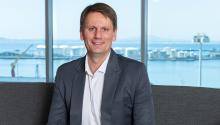Dietmar Schmitt on funds and his investment philosophy

Dietmar Schmitt, a prolific international trader, says his new fund is ready to capitalise on Brexit and is calling for family investors.
Schmitt is the founding chief executive and chief investment officer of SAM Capital Partners, an independent alternative investments firm, based in London.
Originally from Wiesbaden in Germany, Schmitt started his career in the 1980s at Dresdner Bank where he worked in Frankfurt and New York. In 1990, he joined Morgan Stanley and held various roles as a senior European equity trader in London and Frankfurt. He was an acting junior board member at Morgan Stanley Bank in the late 1990s.
In 2001, he joined Cheyne Capital as a senior portfolio manager. He left Cheyne in 2007 to pursue his ambition of setting up his own fund and launched SAM Capital Partners.
Schmitt will present his new SAM Capital UK Long Short Equity Fund to fellow members at the Campden Club Co-Investment Workshop on 30 April. He spoke with CampdenFB about his career to date, his background in family business, his investment strategy and what the fund has to offer.
 Tell us your philosophy when it comes to investing and what have you learned in your journey in finance?
Tell us your philosophy when it comes to investing and what have you learned in your journey in finance?
I’ve learnt a lot about what not to do. No one in the market is 100% accurate over time, but I know how to be careful and when to pull back. We maintain a strong focus on capital preservation. We don’t try to shoot the lights out, rather we protect capital and produce meaningful risk adjusted returns. The biggest mistake one can make, is risking too much and digging a deeper and deeper hole. If you lose 50% you have to make double that to regain the loss.
I understand stocks, how they trade and how they move. I understand the economics of stocks and the underlying companies. I do not take risks I cannot calculate.
Some 30-40% of the trades I do during the day won't make money, that’s just part the business. Our profitable trades make more than the losses, resulting in positive returns on the day. In order to generate true alpha you have to be dynamic and come up with new trade ideas every day. This is what we do at SAM Capital Partners.
 Growing up, were there expectations you would join your family business?
Growing up, were there expectations you would join your family business?
My parents were in the distilling business, it was the second largest brandy distilling business by volume in Germany until they sold it in the 1980s. Since then, we’ve been in German real estate, I manage the liquid assets.
My grandmothers had their own businesses, so there were opportunities to join family businesses, from the age of 16 I was more into stocks and trading than school, I was good with numbers.
I told my parents, and did an apprenticeship in a bank to acquire a banking licence. The plan was to study economics or law. The bank asked me to stay, and I said only if you make me a trader on the exchange in Frankfurt and New York. Sooner than I knew it, I worked in Frankfurt and was later transferred to New York.
My parents were shocked that I didn’t go to university, but I never regretted it and my parents are now very happy.
 What was your career path until you launched SAM Capital Partners?
What was your career path until you launched SAM Capital Partners?
I left Morgan Stanley in 2001 to join a former colleague when he was setting up Cheyne Capital. I was running an internal fund there, with two investors only, his family and mine. In 2007, I spun off with my own company, SAM Capital Partners, where we for the first time opened for external investors. We have done really well—in 2008-09, during the financial crisis, we returned more than a 25% net to investors. We were growing and everything was going well.
I understand personal reasons prompted you to step away temporarily.
My wife got sick with cancer in 2011. I packed up to focus on the family. I kept my Financial Conduct Authority license and, three years ago, we reactivated the dormant company. We have a MENA (Middle East and North Africa) fund, we have done several deals amounting to €150 million+ ($180 million+) real estate transactions, and we also have a successful mergers and acquisitions advisory business. Now we are excited to launch our UK equity long-short fund with the same investment approach and strategy we had previously, as I’ve had continuously improved upon all my life.
 Why did you choose the United Kingdom for your SAM Capital UK Long Short Equity Fund?
Why did you choose the United Kingdom for your SAM Capital UK Long Short Equity Fund?
The reason is very simple—because of Brexit. With Europe moving together in the late 1990s, investor focus became more on sectors as opposed a country-approach.
With the UK now outside of the European Union, a new asset class is forming. Family offices and international institutional investors have significant UK exposure and the investment universe is plentiful across most sectors. Given the new political independence and structural independence from regulators, the UK should be considered a new independent asset class and we want to cater for it.
 What is your fund offering?
What is your fund offering?
We offer a short-term trading fund for investors who want to participate in intra-day market movements.
I’m not like Warren Buffett or traditional long-short fund managers, who buy and hold and charge the investor a storage fee. An analogy I like to use is that of a fruit trader—I buy and sell fruit all day long—apples, bananas, peaches, anything I can trade—and I make small amounts out of each trade. The more turnover I generate, the more money I can take home.
Normally, people with my skills and experience, don’t accommodate institutional investors: ‘A’, because they don’t want to talk to investors, and ‘B’, they're not willing to operate in an institutional framework. We offer that infrastructure and for us it’s a privilege to connect with our investors too.
In addition to Brexit, currency and country risks are reasons for setting up the fund. Many investors think and invest in pounds, and we give them the option to manage currency exposure themselves. The UK is a big market, hyper liquid and fully transparent.
 What is the timeline for your new fund?
What is the timeline for your new fund?
The fund is set-up, the structure is there. We have calls with the chief investment officers of some large investors around the world. Once we have those investors on board and they allow us to publicise their names, it will give huge credibility to our business. We are open to have a conversation about favourable fees for early day investors.
What are the biggest risks you consider?
Country and currency risk, which we eliminate with investing only in one country. That leaves us with one main risk—single stock events. These are mitigated by our conservative position sizing and optimising a balanced portfolio. If you chase high returns, that's the risk you run. We aim for low double digits returns. If we can make five base points a day, we’re happy.
Which stocks do you avoid?
Biotech is a hot topic at the moment, but it’s a long-term investment and not ideal for short-term trading due to high volatility and lack of transparency. We invest in hyper liquid and fully transparent stocks. We have a short-term holding period, from intra-day up to three weeks and we actively trade around every position.

How often do you do that?
Intra-daily, if I can turn over 100% of assets under management (AUM) and I make five basis points on every trade that generates 10% annualised return.
We run a balanced book and we are pure alpha generators. We are agnostic to the market goes up or down. What matters is that the longs don’t lose as much as the shorts, or the other way around when markets go up.
Twenty years ago, I was analysing every single investment case manually. Now we have an algorithm that identifies all possible trades and once we have identified opportunities, we look at the stock itself. Is there any news in the stock or in the sector? Are there any liquidity events, other news that effects the stock price? Once we have done that, we look at it as a fit for the portfolio.
 Usually there are around 30-35 positions in the portfolio, longs or shorts. Positions are typically equally weighted between 3-5%, depending on the trading activity. That means we have about 100-150% of AUM in the market, we use very limited leverage. We are conservative and disciplined; we protect the money to the downside.
Usually there are around 30-35 positions in the portfolio, longs or shorts. Positions are typically equally weighted between 3-5%, depending on the trading activity. That means we have about 100-150% of AUM in the market, we use very limited leverage. We are conservative and disciplined; we protect the money to the downside.
In 2008, we lost about 4.5% where the peer group was down 40% on average. In 2009, January and February, was a disaster for the markets, we made money. In March 2009, when the market fell sharply and then rallied hard, we made money. From November 2008, we had 16 consecutive profitable months. Why? Because we were disciplined. If the market is up 10%, you’re not going to make 10% with us, you make 2-3%. However, when the market is down 10%, we still perform. That’s how we generated outperformance of about 38% over the peer group and outperformed the market by 50%.
It’s not how much money you make in the good times, it’s how little you lose when things go wrong. It’s downside protection. Being conservative has proven to be a very good concept. When I was at Morgan Stanley in the 1990s, I generated about 30% of the profits with 1-2% of the capital that was used, trading around positions and that’s where my skillset lies.
 How would you describe your team at SAM Capital Partners?
How would you describe your team at SAM Capital Partners?
We have a very seasoned and institutionalised team with diverse backgrounds, and a track record of working together. On the advisory board we have Peter Willner, the chief investment officer of the Siemens pension plan.
Our third-party providers are of the highest calibre—Simmons and Simmons as lawyers, Northern Trust as the bank and Ernst & Young as the auditors.
What’s been your experience of engaging with family investors at SAM Capital Partners?
We worked with some great family office investors before my wife got sick, from the UK, Switzerland and Italy.
Our mandate is to make money over time for our investors and I enjoy engaging with family offices, to understand what they do and want to achieve, and hopefully help them in achieving their goals.
 Dietmar Schmitt will present his SAM Capital UK Long Short Equity Fund to fellow members at the virtual Campden Club Co-Investment Workshop on 30 April.
Dietmar Schmitt will present his SAM Capital UK Long Short Equity Fund to fellow members at the virtual Campden Club Co-Investment Workshop on 30 April.
For inquiries, contact Katie Merch-Chammon via katiemerchchammon@campdenwealth.com.
Campden Wealth is not an investment advisory service and is not a registered investment adviser or broker/dealer and has performed no due diligence and does not endorse any investment services, strategies or managers listed in Managerlink or at any other Campden Wealth event. You should perform your own extensive due diligence.






